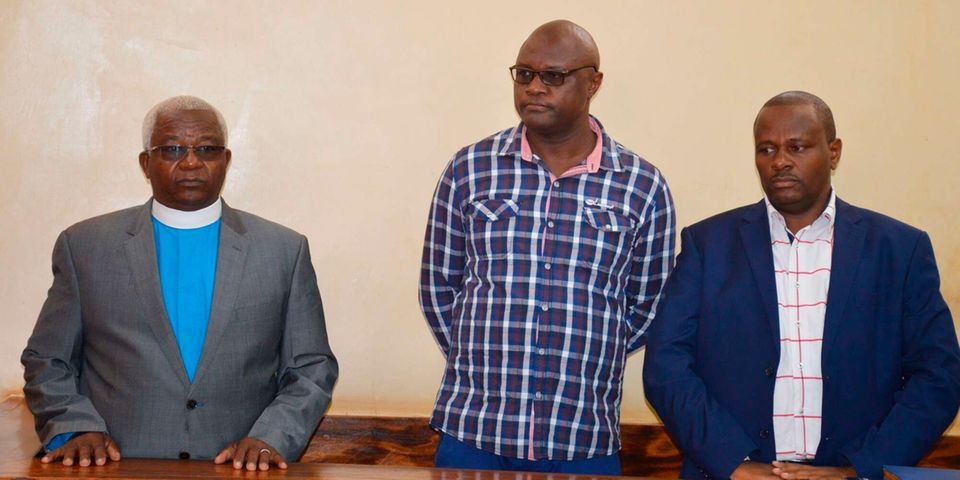A criminal case brought by the Presbyterian Church of East Africa against one of its top clerics was dropped last week, capping off a five-year battle fraught with controversy.
On October 17, 2017, a Kiambu Court charged five people with stealing Sh39.9 million from the Presbyterian Church of East Africa (PCEA).
David Gathanju, the Moderator of the PCEA General Assembly from 2009 to 2015, was among those on trial.
Mr Gathanju was charged alongside former church employees Esther Wanjiru, Peter Mwangi, Stephen Muhoro, and James Muiruri.
According to the charge sheet, the five conspired to steal from the church on various dates between January 2, 2016, and June 30, 2017, at the PCEA headquarters in Nairobi’s South C estate.
They were accused of stealing Sh39.9 million in the second count, which came into their possession as a result of their employment.
They both denied the charges and were released on Ksh1 million bail.Before entering the plea, the defense team tried in vain to persuade the prosecution to postpone the case to allow for dialogue with the church.
The defense argued that the church had mechanisms in place to deal with such issues.
Lydia Maari, the prosecution’s counsel in the case at the time, stood firm, saying there was enough evidence to convict the individuals.
However, the prosecution dropped the case against Ms. Wanjiru just three months later, in January 2018.
Mr Muhoro, claiming that there was no evidence to back up the charges.
The charges against the remaining three were upgraded in March 2019, and they were now accused of stealing Sh50.9 million.
The Director of Public Prosecutions (DPP) filed an application in October 2020 to withdraw the theft case against.
The complainant in the case, Rev Peter Kania, had since died, according to Mr. Gathanju and his co-accused.
However, Kiambu Senior Principal Magistrate Stella Atambo denied the application, stating that the prosecution had failed to persuade the court to accept the plea.
The magistrate ruled that the death of the complainant, who was also a witness in the case, was insufficient reason to dismiss the suit.
Dissatisfied with her decision, the State petitioned the High Court in Kiambu for a revision of Ms Atambo’s ruling.
However, Kiambu High Court Judge Mary Kasango in May this year declined to set aside the ruling by the lower court and agreed with the accused that the case should continue.
When the case came up for hearing on September 3, the prosecution counsel, Sammy Muriuki, told the court that the DPP had received communication from the church to have the matter withdrawn.
The church’s lawyer, Grace Gichuhi, told the court that the church wished the matter to be closed “in totality”.
Kiambu Senior Principal Magistrate Kibet Sambu acquitted the accused under Section 202 of the Criminal Procedure Code, marking the end of a case lodged in court five years ago.
The case has had 31 mentions and 31 hearing dates. The case was successfully heard on only four occasions, culminating in only one witness testifying.
Only the church accountant, Jane Mwihaki, testified in the case.
The case was also not without drama. During a heated debate in one of the court sessions, details emerged that the complainant had authorized the transfer of funds which was the bone of contention in the case.
A statement by the then Equity Bank Nairobi West Branch manager, Chebet Rotich, tabled in court indicated that before effecting any transfers from one account to another, the manager would call Mr. Kania to confirm whether the church management had sectioned such transactions.
Ms. Chebet added that in Mr. Kania’s absence, she would contact the treasurer, Amon Nderi, to confirm the transactions.
She went on to say that she would call the pair using the bank’s landline number, which is also used to verify the signatories on the funds transfer.
Ms. Chebet stated in her statement that Mr. Kania informed her in June 2017 that he had learned that the money normally collected by Mr. Mwangi, who was a signatory to some of the accounts, was being stolen.
Mr. Kania had told her that he had tried unsuccessfully to contact Mr. Mwangi. He requested to see a funds transfer application form in order to determine where the money was being transferred.
\\
